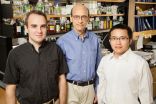(Press-News.org) CHAMPAIGN, Ill. — Scientists have discovered a previously unknown mechanism by which estrogen prepares cells to divide, grow and, in the case of estrogen-positive breast cancers, resist cancer drugs. The researchers say the work reveals new targets for breast cancer therapy and will help doctors predict which patients need the most aggressive treatment.
The University of Illinois team reports its findings in the journal Oncogene.
Estrogen pre-activates the unfolded-protein response (UPR), a pathway that normally protects cells from stress, the researchers report. The UPR spurs the production of molecular chaperones that prepare cells to divide and grow. Without chaperone proteins to do the work of folding and packaging other proteins, cells – including cancer cells – cannot divide. For this reason, chaperones are a popular target for new cancer therapies.
Activation of the UPR is known as a normal response to stress – when a cell lacks adequate oxygen or nutrients, for example, or is exposed to cancer-killing drugs. UPR activation prepares the cell for major changes associated with cell growth, division and survival under stress.
It wasn't known before this study, however, that estrogen initiates this pathway before such stresses appear, said University of Illinois biochemistry professor David Shapiro, who led the new analysis with lead author, M.D.-Ph.D.-student Neal Andruska.
"This is a new role for estrogen in the pathology of cancer," Shapiro said. "Others have shown that stress activates this pathway, helping to protect some tumors. What is new is our finding that estrogen can pre-activate this pathway to protect tumors."
When estrogen binds to its receptor it sparks a cascade of molecular events in the cell. A key event occurs when a channel opens in the membrane of a compartment that stockpiles calcium, and calcium floods into the cell.
"That's a signal to activate the UPR pathway, the stress pathway," Shapiro said. "It's also a signal that many researchers think has something to do with cell proliferation. The calcium itself may be a proliferation signal."
The stress-response pathway induces the production of chaperone proteins.
"I like to think of this pathway as an assembly line," Shapiro said. "In order for cells to divide, you're going to have to produce a lot more proteins. The chaperones help you to package, fold up and ship all these proteins."
The UPR also is a mediator of cell death. If a normal cell is exposed to too much stress, the stress response spurs apoptosis, a kind of cellular suicide. In cancer, however, mild activation of the UPR by estrogen blunts this cell-death pathway, allowing cancer cells to survive and even resist drugs, the researchers found.
The team also looked at the expression of UPR-related genes in publicly available data from samples of breast tumors obtained from women who had been diagnosed up to 15 years prior.
"Andruska, who spearheaded the research and carried out the computer analysis of the breast cancer data, found that UPR activation is a very powerful prognostic marker of the course of a woman's disease," Shapiro said.
The analysis revealed that among women with estrogen-receptor-positive breast cancer who underwent tamoxifen therapy, breast cancer was 3.7 times more likely to recur in those overexpressing the UPR. Ten years after a breast cancer diagnosis, only 15 percent of those with the highest level of UPR-gene expression were disease-free, compared with 80 percent of women with minimal UPR expression.
"Our marker helps identify breast cancers that are likely to be highly aggressive and therefore require intensive therapy," Shapiro said.
INFORMATION:
U. of I. graduate student Xiaobin Zheng, postdoctoral researcher Xujuan Yang and food science and human nutrition professor William Helferich contributed to the research.
The National Institute of Diabetes and Digestive and Kidney Diseases at the National Institutes of Health funded the research.
Editor's notes:
To reach David Shapiro, call 217-333-1788; email djshapir@illinois.edu.
The paper, "Anticipatory Estrogen Activation of the Unfolded Protein Response is Linked to Cell Proliferation and Poor Survival in Estrogen Receptor Alpha Positive Breast Cancer," is available to members of the media from the U. of I. News Bureau.
Scientists discover a new role for estrogen in the pathology of breast cancer
2014-09-29
ELSE PRESS RELEASES FROM THIS DATE:
Climate change appears a mixed bag for a common frog
2014-09-29
Scientists have found amphibians worldwide are breeding earlier due to climate change, but how that affects species is just now being answered.
After warmer winters, wood frogs breed earlier and produce fewer eggs, a Case Western Reserve University researcher has found.
Michael F. Benard, the George B. Mayer Chair in Urban and Environmental Studies and assistant professor of biology, also found that frogs produce more eggs during winters with more rain and snow.
Benard's study, published today in the journal Global Change Biology, is among the first in a natural habitat ...
After-school exercise program enhances cognition in 7-, 8- and 9-year-olds
2014-09-29
CHAMPAIGN, Ill. — A nine-month-long, randomized controlled trial involving 221 prepubescent children found that those who engaged in moderate-to-vigorous physical activity for at least 60 minutes a day after school saw substantial improvements in their ability to pay attention, avoid distraction and switch between cognitive tasks, researchers report in the journal Pediatrics.
Half of the study subjects were randomly assigned to the after-school program and the rest were placed on a wait list. All participants underwent cognitive testing and brain imaging before and after ...
Hand size appears to stay constant, providing natural 'ruler'
2014-09-29
People tend to perceive their dominant hand as staying relatively the same size even when it's magnified, lending support to the idea that we use our hand as a constant perceptual "ruler" to measure the world around us. The findings are published in Psychological Science, a journal of the Association for Psychological Science.
"These findings suggest that our bodies are used as perceptual metrics, meaning that we are more likely to attribute changes in the perceived size of the hand to changes in the world — instead of thinking that our hand has become bigger, we're more ...
More children admitted to intensive care but with lower staffing ratios
2014-09-29
More children than ever are being admitted to intensive care units in England and Wales but there are fewer staff per bed available to cope with the increase, according to a new report published jointly by the University of Leeds and University of Leicester.
The Paediatric Intensive Care Audit Network (PICANet) report showed that there was a 15% increase in admissions over a 10-year period between 2004 and 2013, but this included an increase of 4% that was not due to changes in the childhood population.
At the same time, staffing levels have increased by 36% but this ...
Researchers identify early sign of pancreatic cancer
2014-09-28
BOSTON –– Scientists at Dana-Farber Cancer Institute, the Massachusetts Institute of Technology, and other institutions have discovered a sign of the early development of pancreatic cancer – an upsurge in certain amino acids that occurs before the disease is diagnosed and symptoms appear. The research is being published online today by the journal Nature Medicine.
Although the increase isn't large enough to be the basis of a new test for early detection of the disease, the findings will help researchers better understand how pancreatic cancer affects the rest of the body, ...
Human genome was shaped by an evolutionary arms race with itself
2014-09-28
New findings by scientists at the University of California, Santa Cruz, suggest that an evolutionary arms race between rival elements within the genomes of primates drove the evolution of complex regulatory networks that orchestrate the activity of genes in every cell of our bodies.
The arms race is between mobile DNA sequences known as "retrotransposons" (a.k.a. "jumping genes") and the genes that have evolved to control them. The UC Santa Cruz researchers have, for the first time, identified genes in humans that make repressor proteins to shut down specific jumping ...
Docetaxel or pemetrexed with cisplatin achieve comparable outcomes in non-squamous Lu Ca
2014-09-27
The first direct comparison of treating non-squamous lung cancer with either pemetrexed or docetaxel in addition to cisplatin has shown that the two combinations achieve similar progression-free survival, although docetaxel was associated with more frequent adverse events.
At the ESMO 2014 Congress in Madrid, Dr Young-Chul Kim from Chonnam National University Medical School, South Korea, reported the results of an open-label phase III trial that included 149 patients with non-squamous non-small cell lung cancer (NSCLC) conducted at 14 centres in South Korea.
"We wanted ...
Customising chemotherapy in Lu Ca: New Ph II data reported in 2 LB studies
2014-09-27
Measuring the expression levels of an enzyme involved in DNA synthesis can help predict the response of lung cancers to certain treatments, a Korean study has shown at the ESMO 2014 Congress in Madrid.
In a randomized phase II study, researchers showed that patients whose lung cancers expressed low levels of an enzyme called thymidylate synthase experienced a greater benefit from treatment with the combination of pemetrexed and cisplatin than those whose tumours expressed high levels.
"Thymidylate synthase is one of the proteins that is targeted by pemetrexed which ...
French studies measure benefits of colorectal cancer screening
2014-09-27
The introduction of biennial colorectal cancer screening in a region of France increased the rate of diagnosis of high risk pre-cancerous adenomas (sometimes called polyps) by 89%, researchers have reported at the ESMO 2014 Congress in Madrid.
Dr Vanessa Cottet from INSERM Unité 866 in Dijon, France, and colleagues studied the region of Côte-d'Or, where a registry has been collecting data on adenomas since 1976. They wanted to evaluate the rate of diagnosis of adenomas before and after the initiation of a screening program using fecal occult blood testing that began ...
Crizotinib treatment effective against ROS1-positive lung cancer
2014-09-27
Treatment with the targeted therapy drug crizotinib effectively halts the growth of lung tumors driven by rearrangements of the ROS1 gene. In an article receiving Online First publication in the New England Journal of Medicine to coincide with a presentation at the European Society for Medical Oncology meeting, an international research team reports that crizotinib treatment led to significant tumor shrinkage in 36 of 50 study participants and suppressed tumor growth in another 9.
"Prior to this study, there were a handful of reports describing marked responses to crizotinib ...




